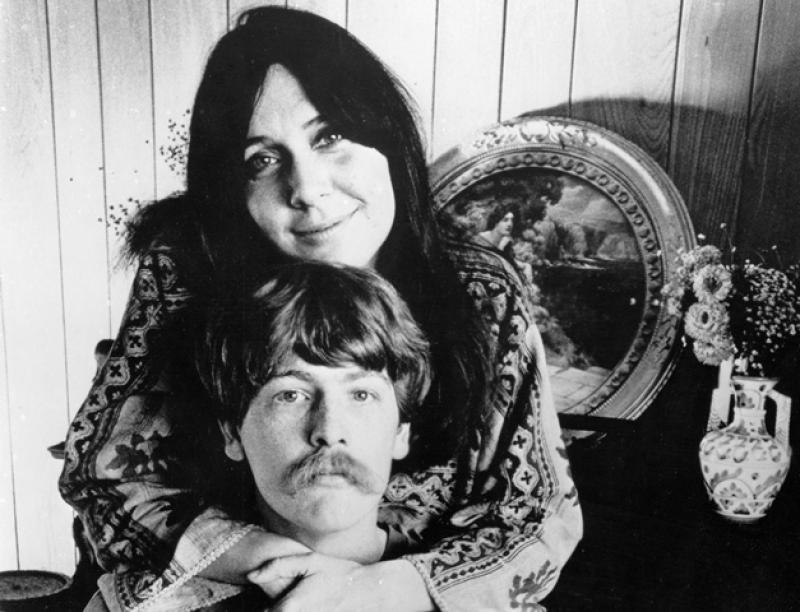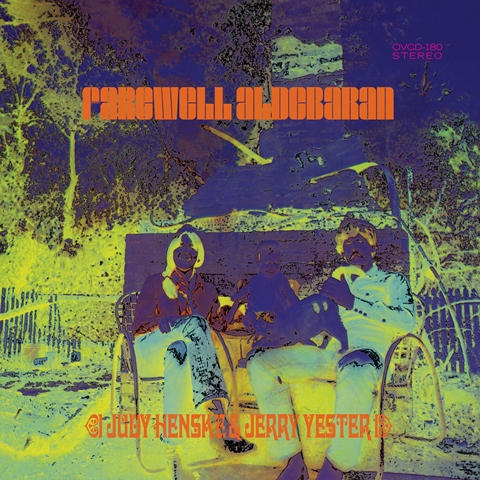Reissue CDs Weekly: Judy Henske & Jerry Yester | reviews, news & interviews
Reissue CDs Weekly: Judy Henske & Jerry Yester
Reissue CDs Weekly: Judy Henske & Jerry Yester
The mystical 'Farewell Aldebaran' gets its first-ever legal reissue

In 1969, a tranche of American musicians looked back to the country’s past for inspiration. Bob Dylan followed John Wesley Harding with Nashville Skyline. The Band’s eponymous second album hit the shops. The Flying Burrito Brothers debuted with The Gilded Palace of Sin. The rootsy was a default. But choosing to draw on country and Appalachian traditions did not have to mean playing it straight.
Farewell Aldebaren has been hard to find and its reappearance is a cause for celebration. It has been bootlegged a couple of times but this new legal reissue marks its first ease of availability since 1969. The album was originally issued by the ironically named Straight, a label run by Frank Zappa and his manager Herb Cohen. Others on the roster included Tim Buckley, the early, freaky Alice Cooper and Captain Beefheart. They had another label, Bizarre. Straight was meant to showcase their relatively mainstream artists. Nothing on either label would assault the charts.
 Judy Henske and Jerry Yester were married and had moved from Greenwich Village to the San Fernando Valley, outside Los Angeles, in early 1968. The album was recorded a year later. Each was embedded in the music business and had pasts suggesting their first album together could be folk- or roots-inclined. But nothing suggested they would come up with anything as far-out, mystical and wonderful as Farewell Aldebaran.
Judy Henske and Jerry Yester were married and had moved from Greenwich Village to the San Fernando Valley, outside Los Angeles, in early 1968. The album was recorded a year later. Each was embedded in the music business and had pasts suggesting their first album together could be folk- or roots-inclined. But nothing suggested they would come up with anything as far-out, mystical and wonderful as Farewell Aldebaran.
Yester had been in pop-folkies The New Christy Minstrels and The Modern Folk Quartet. Both were significant hothouses: Chip Douglas and Henry Diltz were also in the latter while, at varying points, Kim Carnes, Gene Clark, Roger McGuinn and Barry McGuire were in the former. Yester went on the produce his brother’s band The Association and Tim Buckley’s Goodbye & Hello and Happy Sad. He had a short spell in The Lovin’ Spoonful and issued two solo singles in 1967. The pointers to Farewell Aldebaran were the baroque, expansive arrangements of Goodbye & Hello, the 1967 solo B-side “Ashes Have Turned” which he co-wrote with Henske (she also sang on it) and the same year’s remarkable A-side “I Can Live Without You”. Each of the solo tracks was identifiably a form of folk-rock, but the melodic sensibility – following each section of melody with another to build crescendos – was indebted to Gregorian chant and plainsong.
Judy Henske's solo albums hop-scotched through blues, folk, show tunes and even soul
Henske had been a fixture on the American folk-blues scene since the late 1950s and issued her first album in 1963. She had released four before Farewell Aldebaran and was not-yet a songwriter. Her voice was big, powerful and instantly identifiable. Yet each album hop-scotched through blues, folk, show tunes and even soul. It now feels as though there was little idea of how to consistently frame her voice.
When the couple set out to make their album, the lyrical well they drew on was Henske’s. She had written an extraordinary group of literate song-poems setting oblique commentary on their life and her past against evocations of the fate of a fallen knight, a mare’s connection with the man who had stolen her, and the biography of a ship named Charity which yearned for a safe harbour. The album climaxed with a disquisition on estrangement inspired by questioning what it would be like if the giant star Aldebaren dominated the entire sky.
While clearly of their moment, once the rough-edged opening blues stomp “Snowblind” was out of the way, the intense, spiritual results of the collaboration suggested the medieval as well as the roots of America’s music.Henske's musical setting was finally right. Despite being issued in France, Germany and the UK as well as America, the monumental and timeless Farewell Aldebaran (produced by Yester with the Spoonful’s Zal Yanovsky) barely sold. It is impossible to know how many people were paying attention in 1969, but the line between this instant cult item and the 4AD label's slant on goth in the 1980s is clear.
The reissue of this essential album supplements the original 10 tracks with previously unheard instrumental demos of five of the songs. In the liner notes, it is described as ending on a note of “seething cosmic oblivion”. To this, Yester says, “We were very up about doing the album. There was no darkness as far as we were concerned.” Nonetheless, the timeless, unique Farewell Aldebaran is imbued with dark magic.
Explore topics
Share this article
The future of Arts Journalism
You can stop theartsdesk.com closing!
We urgently need financing to survive. Our fundraising drive has thus far raised £49,000 but we need to reach £100,000 or we will be forced to close. Please contribute here: https://gofund.me/c3f6033d
And if you can forward this information to anyone who might assist, we’d be grateful.

Subscribe to theartsdesk.com
Thank you for continuing to read our work on theartsdesk.com. For unlimited access to every article in its entirety, including our archive of more than 15,000 pieces, we're asking for £5 per month or £40 per year. We feel it's a very good deal, and hope you do too.
To take a subscription now simply click here.
And if you're looking for that extra gift for a friend or family member, why not treat them to a theartsdesk.com gift subscription?
more New music
 Trio da Kali, Milton Court review - Mali masters make the ancient new
Three supreme musicians from Bamako in transcendent mood
Trio da Kali, Milton Court review - Mali masters make the ancient new
Three supreme musicians from Bamako in transcendent mood
 Pop Will Eat Itself's 'Delete Everything' is noisy but patchy
Despite unlovely production, the Eighties/Nineties unit retain rowdy ebullience
Pop Will Eat Itself's 'Delete Everything' is noisy but patchy
Despite unlovely production, the Eighties/Nineties unit retain rowdy ebullience
 Music Reissues Weekly: The Earlies - These Were The Earlies
Lancashire and Texas unite to fashion a 2004 landmark of modern psychedelia
Music Reissues Weekly: The Earlies - These Were The Earlies
Lancashire and Texas unite to fashion a 2004 landmark of modern psychedelia
 Odd times and clunking lines in 'The Life of a Showgirl' for Taylor Swift
A record this weird should be more interesting, surely
Odd times and clunking lines in 'The Life of a Showgirl' for Taylor Swift
A record this weird should be more interesting, surely
 Waylon Jennings' 'Songbird' raises this country great from the grave
The first of a trove of posthumous recordings from the 1970s and early 1980s
Waylon Jennings' 'Songbird' raises this country great from the grave
The first of a trove of posthumous recordings from the 1970s and early 1980s
 Lady Gaga, The Mayhem Ball, O2 review - epic, eye-boggling and full of spirit
One of the year's most anticipated tours lives up to the hype
Lady Gaga, The Mayhem Ball, O2 review - epic, eye-boggling and full of spirit
One of the year's most anticipated tours lives up to the hype
 Slovenian avant-folk outfit Širom’s 'In the Wind of Night, Hard-Fallen Incantations Whisper' opens the door to inner space
Unconventional folk-based music which sounds like nothing else
Slovenian avant-folk outfit Širom’s 'In the Wind of Night, Hard-Fallen Incantations Whisper' opens the door to inner space
Unconventional folk-based music which sounds like nothing else
 'The Art of Loving': Olivia Dean's vulnerable and intimate second album
Neo soul Londoner's new release outgrows her debut
'The Art of Loving': Olivia Dean's vulnerable and intimate second album
Neo soul Londoner's new release outgrows her debut
 Music Reissues Weekly: The Peanut Butter Conspiracy - The Most Up Till Now
Definitive box-set celebration of the Sixties California hippie-pop band
Music Reissues Weekly: The Peanut Butter Conspiracy - The Most Up Till Now
Definitive box-set celebration of the Sixties California hippie-pop band
 Doja Cat's 'Vie' starts well but soon tails off
While it contains a few goodies, much of the US star's latest album lacks oomph
Doja Cat's 'Vie' starts well but soon tails off
While it contains a few goodies, much of the US star's latest album lacks oomph
 Mariah Carey is still 'Here for It All' after an eight-year break
Schmaltz aplenty but also stunning musicianship from the enduring diva
Mariah Carey is still 'Here for It All' after an eight-year break
Schmaltz aplenty but also stunning musicianship from the enduring diva

Add comment